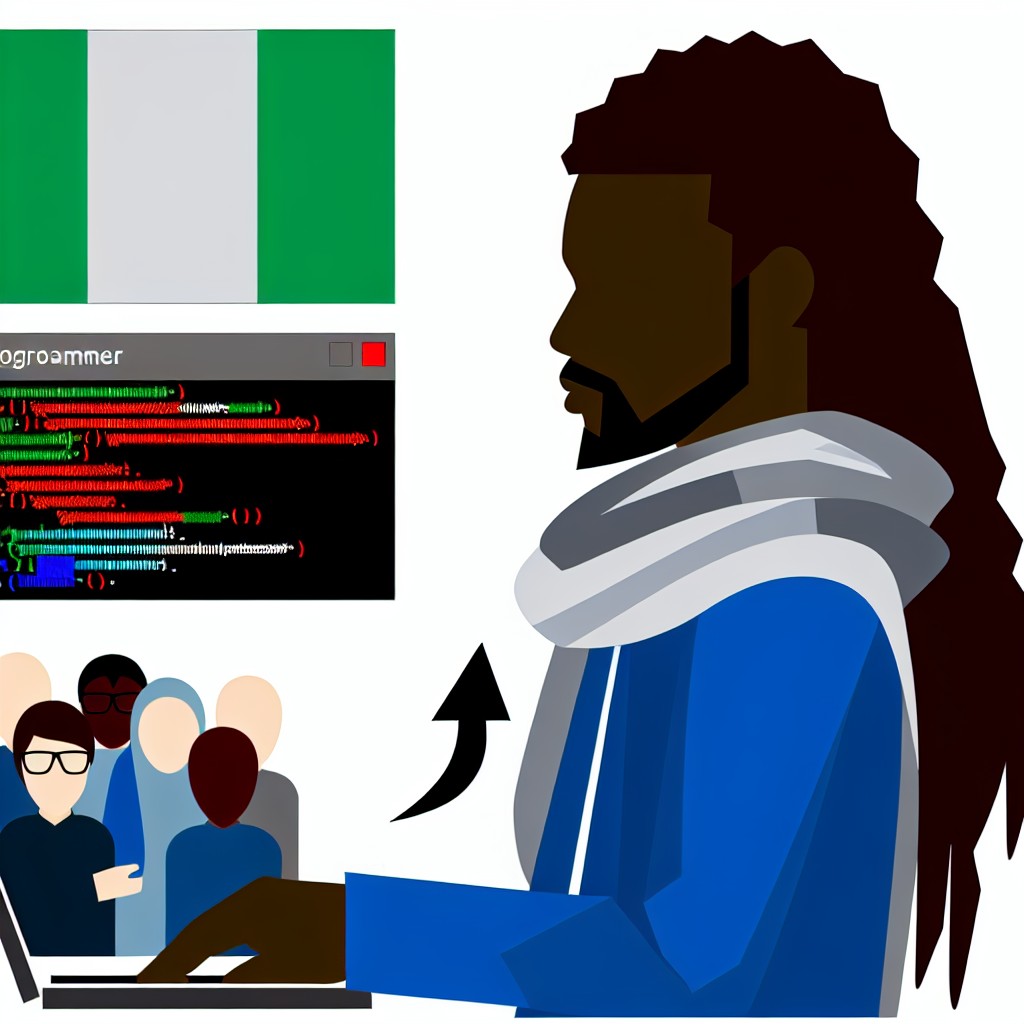Overview of Popular Programming Languages Used in AI Development Globally and in Nigeria
Global Trends in AI Programming Languages
Python leads the world in AI development due to its simplicity and extensive libraries.
Developers widely adopt libraries like TensorFlow, PyTorch, and scikit-learn in Python.
Moreover, R remains popular for statistical computing and data analysis in AI projects.
Java also plays a significant role, especially in large-scale enterprise AI applications.
Its platform independence and scalability attract many corporations worldwide.
Additionally, languages like Julia and Scala are gaining attention for high-performance AI tasks.
Popular AI Programming Languages in Nigeria
Nigeria’s AI community predominantly uses Python for research and development projects.
Emerging startups, such as CediTech Innovations, leverage Python’s ecosystem extensively.
Furthermore, universities include Python and R in their AI and data science curricula.
Java finds use in fintech companies like SterlingAI, which deploy AI-driven solutions at scale.
Besides, many Nigerian developers explore JavaScript frameworks for AI-related web applications.
Lastly, local mentoring organizations encourage learning Python and Java to build AI skills.
Factors Influencing Language Choice in Nigeria
Accessibility to open-source libraries heavily influences language selection among Nigerian developers.
Also, Python’s clear syntax helps beginners rapidly develop AI prototypes.
Moreover, available community support fosters adoption of popular AI languages in Nigeria.
Unlock Your Unique Tech Path
Get expert tech consulting tailored just for you. Receive personalized advice and solutions within 1-3 business days.
Get StartedCompanies like AfriTech Dynamics prioritize languages that integrate well with existing infrastructure.
Government and academic institutions promote hands-on experience with Python and R for research.
Significance of Key AI Programming Languages
- Python: Dominant language with vast AI libraries and beginner-friendly syntax.
- R: Preferred for statistical analysis and academic research.
- Java: Common in corporate solutions with platform-independent features.
- JavaScript: Used for interactive AI applications on the web.
- Julia and Scala: Emerging languages for performance-driven AI tasks.
Role of Python in Advancing AI Projects within Nigeria’s Tech Ecosystem
Python’s Popularity Among Nigerian AI Developers
Python has gained widespread popularity among AI developers in Nigeria.
Its simplicity and readability make it accessible to beginners and experts alike.
Many local tech hubs and startups favor Python for AI development.
Moreover, Python’s large community offers strong support to Nigerian programmers.
Key Python Libraries Empowering AI Innovations
Python provides a rich set of libraries tailored for AI and machine learning.
Developers frequently use TensorFlow and PyTorch for building neural networks.
Libraries like scikit-learn simplify data analysis and modeling tasks.
These tools accelerate prototype development and deployment across Nigerian firms.
Educational Initiatives Promoting Python for AI
Several Nigerian universities incorporate Python in their AI curricula.
Institutions such as the University of Lagos offer specialized AI and data science courses.
Coding bootcamps like NaijaTechLabs provide hands-on Python training.
These initiatives cultivate a growing talent pool skilled in Python-driven AI.
Unlock Premium Source Code for Your Projects!
Accelerate your development with our expert-crafted, reusable source code. Perfect for e-commerce, blogs, and portfolios. Study, modify, and build like a pro. Exclusive to Nigeria Coding Academy!
Get CodeLocal Startups Leveraging Python to Solve Nigerian Challenges
Innovative Nigerian startups harness Python to address real-world problems.
Kadi Tech uses Python to develop AI-powered health diagnostics.
Likewise, FinSolve applies Python for predictive analytics in the financial sector.
Python helps transform Nigeria’s economy through AI-driven solutions.
Collaborations and Community Growth
The Python Nigeria user group fosters knowledge sharing and networking.
They regularly host workshops and hackathons to advance AI skillsets.
Partnerships between tech companies and academia promote Python-based AI research.
This collaborative spirit strengthens Nigeria’s AI ecosystem continuously.
Impact of Java and JavaScript in Building Scalable AI Applications Locally
Java’s Role in Scalable AI Solutions
Java powers many AI projects in Nigeria due to its robustness and platform independence.
Its strong memory management ensures AI applications run efficiently on various devices.
Moreover, its vast ecosystem offers a wealth of libraries useful for machine learning and data processing.
For instance, developers at Lagos-based tech startup IntellectSoft leverage Java to build reliable AI models.
Consequently, these AI systems scale well to meet increasing user demands across sectors.
Java’s multi-threading capabilities also facilitate the development of responsive AI applications.
Therefore, companies like TechNaira Solutions benefit from Java’s performance for their intelligent automation tools.
JavaScript’s Influence on AI Development
JavaScript enables the creation of dynamic AI-powered web applications in Nigeria.
Its compatibility with browsers simplifies deploying AI features directly to end users.
In addition, frameworks like TensorFlow.js allow running machine learning models client-side.
As a result, startups such as Abuja’s NeuralFront utilize JavaScript to deliver efficient real-time AI services.
Furthermore, JavaScript’s event-driven architecture enhances user interaction in AI tools.
This makes the technology ideal for chatbots and recommendation engines developed by local innovators.
Overall, JavaScript fosters rapid prototyping and iteration of AI solutions within Nigerian tech hubs.
Collaborative Use of Java and JavaScript for Enhanced Scalability
Many Nigerian developers integrate Java and JavaScript to maximize AI application scalability.
For example, backend systems often use Java for processing, while JavaScript manages the frontend interface.
This separation allows seamless user experiences with powerful data handling behind the scenes.
Startups like Kinetix AI in Abuja employ this approach to serve clients reliably under heavy loads.
Additionally, combining both languages speeds up development cycles by leveraging their respective strengths.
Consequently, Nigerian AI firms can deploy sophisticated solutions that grow with the market demand.
Benefits of Using Java and JavaScript for Local AI Development
-
Java and JavaScript accessibility supports Nigeria’s growing AI talent pool.
-
Open-source tools and communities accelerate learning and innovation nationwide.
-
Scalable architectures built with these languages reduce costs for emerging startups.
-
Interoperability with cloud platforms enables deployment of AI services across Africa.
-
Local companies such as HabaTech Innovations demonstrate success using these technologies.
Discover More: Understanding the Strengths of Programming Languages for Nigerian Projects
Significance of Data-Centric Languages like R in Nigerian AI Research and Analytics
Role of R in Nigerian AI Research
R plays a crucial role in Nigeria’s AI research landscape.
It provides powerful tools for statistical computing and data visualization.
Researchers such as Amara Nnaji leverage R to analyze complex datasets.
Additionally, R supports rapid prototyping of machine learning models.
This capability accelerates AI experimentation across Nigerian universities and startups.
Advantages of Using R for Data Analytics
R offers extensive libraries tailored for data cleaning and transformation.
Packages like dplyr and tidyr simplify data manipulation tasks.
Moreover, its visualization tools such as ggplot2 help present insights clearly.
Data scientists at companies like Nexaris Analytics benefit from these functionalities daily.
Thus, R helps transform raw data into actionable intelligence efficiently.
Impact on Industry and Government Applications
Nigerian fintech firms employ R to detect fraudulent transactions effectively.
Similarly, health organizations use R to analyze epidemiological data for disease tracking.
The Nigerian government leverages R in policy planning through informed data analysis.
Startups such as Lagos Data Labs use R to create predictive models for agriculture.
R’s data-centric strengths enable innovation across sectors nationwide.
Community and Education Support
The Nigerian R User Group offers workshops and training sessions regularly.
This community facilitates skill development among aspiring data scientists.
Universities like Obafemi Awolowo University integrate R into their AI and data science curriculum.
Students graduate equipped with practical analytics expertise.
These efforts contribute to sustaining a growing ecosystem of R professionals in Nigeria.
You Might Also Like: The Role of JavaScript in Powering Nigerian Tech Innovations
How Nigeria’s Coding Academies Integrate AI-Focused Programming Languages
Growing Importance of AI Education in Nigeria
Nigeria’s tech ecosystem rapidly embraces artificial intelligence innovations.
Consequently, coding academies adapt their curricula to meet this demand.
They incorporate AI-focused programming languages to prepare students effectively.
Such efforts empower learners to contribute to AI-driven solutions locally and globally.
Selection of Programming Languages Based on AI Relevance
Coding academies prioritize languages widely used in AI development.
Python leads due to its versatile AI libraries and ease of learning.
Additionally, R is taught for statistical computing and data analysis.
Some academies introduce JavaScript for AI applications within web environments.
Furthermore, Julia is gaining attention for high-performance numerical computing.
Curriculum Design and Course Integration
Academies structure courses to build foundational programming skills first.
Then, they integrate AI-specific modules covering machine learning and deep learning.
Hands-on projects using real-world datasets accelerate practical understanding.
Moreover, collaborations with AI startups enhance curriculum relevance and exposure.
Training Instructors and Collaborating with Industry
Institutes invest in training instructors on the latest AI technologies.
For instance, Mr. Tunde Olajide leads workshops on applied Python for AI.
Partnerships with companies like DataSense Nigeria provide mentorship opportunities.
These collaborations keep teaching materials current with industry shifts.
Supporting Student Innovation and AI Entrepreneurship
Coding academies host AI hackathons to encourage innovative thinking.
They support students in developing AI applications for local challenges.
Initiatives such as the Lagos AI Lab provide incubation and networking resources.
Therefore, students gain experience and create viable AI businesses.
Expanding Access Through Online and Community Programs
Academies extend AI programming courses via online platforms.
This approach reaches learners beyond urban centers like Lagos and Abuja.
Community-based workshops promote skills among underrepresented groups.
Consequently, Nigeria broadens its AI talent pool inclusively and effectively.
Uncover the Details: Why Python Is a Favorite Among Nigerian Developers
Challenges Faced by Nigerian Developers in Accessing AI Development Tools and Languages
Limited Infrastructure and Internet Connectivity
Nigeria faces significant infrastructure challenges that hinder AI tool access.
Many developers experience slow or unreliable internet connections.
Consequently, downloading large AI frameworks becomes difficult.
Power outages also disrupt development workflows frequently.
Furthermore, unstable connectivity affects cloud-based AI platform usage.
High Cost of Software and Licensing
Purchasing proprietary AI software often strains developers’ budgets.
Additionally, some essential tools require costly licenses unavailable to many.
Even subscription fees for cloud GPUs can be prohibitive.
Therefore, many developers turn to free or open-source alternatives instead.
Limited Access to Advanced Programming Languages and Libraries
Some AI libraries and tools have limited support or availability locally.
For instance, uncommon or emerging AI languages are hard to learn due to scarce resources.
Moreover, documentation in regional languages is rarely available.
As a result, developers face a steeper learning curve for advanced AI technologies.
Educational and Skill Gaps
Many Nigerian universities offer limited AI-focused programming language courses.
Students thus lack hands-on experience with popular AI frameworks like TensorFlow or PyTorch.
Nevertheless, independent communities and tech hubs provide some learning opportunities.
Yet, these avenues cannot fully compensate for systemic educational shortfalls.
Language Barriers and Documentation
Most AI development tools prioritize English-language documentation.
Consequently, non-English speakers encounter additional challenges understanding technical materials.
Also, some tutorials lack clear examples relevant to the Nigerian context.
This gap reduces efficient knowledge transfer among developers.
Community and Collaboration Challenges
Active AI development communities are still growing in Nigeria.
New developers often lack mentors familiar with specific programming languages.
Moreover, opportunities for collaboration on large AI projects remain scarce.
Therefore, exchange of best coding practices occurs less frequently.
Government and Policy Constraints
Limited governmental support slows access to advanced computational resources.
Furthermore, import taxes raise hardware costs critical for AI programming.
Without strong policies encouraging technological investment, challenges persist.
Nonetheless, some initiatives like tech incubators are beginning to address these gaps.
Key Barriers Impacting AI Development Progress
- Unstable internet and power supply impact development consistency.
- High software costs limit use of cutting-edge AI tools.
- Education gaps reduce proficiency in AI programming languages.
- Language and documentation barriers hinder effective learning.
- Limited collaborative networks restrict knowledge sharing.
- Policy issues affect availability of necessary computing hardware.
Gain More Insights: How Local Needs Shape Programming Language Preferences in Nigeria

Government and Private Sector Initiatives Promoting AI Programming Skill Development in Nigeria
Government-Led Programs Advancing AI Education
The Nigerian government actively fosters AI skill development nationwide.
For instance, the National Information Technology Development Agency launched AI training workshops.
These programs target young professionals and university students across key cities.
Moreover, the Ministry of Science and Technology invests in AI research centers.
Consequently, institutions like the Abuja AI Innovation Hub have emerged as learning centers.
The government also collaborates with universities to update their computer science curricula.
This approach ensures students gain exposure to modern AI programming languages.
Additionally, the Digital Transformation Strategy supports nationwide coding bootcamps.
These initiatives encourage software development skills focused on machine learning and data science.
Private Sector Contributions to Building AI Talent
Nigerian companies play a crucial role in developing AI programming skills.
Leading firms such as TechNova Nigeria and MobiNext Tech offer in-house AI training sessions.
They partner with global technology providers to deliver cutting-edge knowledge.
Furthermore, startups like AvaBot Solutions organize hackathons to discover and nurture talent.
These events boost programmers’ practical skills in real-world AI applications.
Corporate sponsorships enable scholarships for promising AI learners at premier institutions.
In particular, Omoluabi Technologies supports coding academies in Lagos and Port Harcourt.
They focus on empowering underrepresented groups, including women and rural youths.
Collaborative Efforts Between Public and Private Sectors
Collaboration between government agencies and companies accelerates AI skill development.
Joint initiatives like the Lagos AI Skills Consortium provide shared resources.
They offer workshops, internships, and mentorship programs for emerging developers.
For example, the consortium recently launched a Python for AI series tailored to Nigerian challenges.
This course aligns with industry needs and government digital goals.
Furthermore, partnerships facilitate access to cloud computing platforms for hands-on learning.
Therefore, programmers gain experience using tools like TensorFlow and PyTorch effectively.
These combined efforts strengthen Nigeria’s AI programming ecosystem dynamically.
Case Studies of Successful AI Startups in Nigeria Leveraging Specific Programming Languages
FinTech Innovation with Python at KudiAI
KudiAI has revolutionized financial services in Nigeria using Python.
The team chose Python for its rich AI and machine learning libraries.
Moreover, Python enables rapid prototyping and easy integration with other systems.
By leveraging TensorFlow and scikit-learn, KudiAI enhances credit scoring accuracy.
Consequently, their chatbot assists millions with seamless financial transactions daily.
They also utilize Flask and Django frameworks to build scalable backend services.
Ultimately, this tech stack boosts customer engagement and operational efficiency.
Healthcare Advancements Using JavaScript at HealthWise AI
HealthWise AI improves healthcare delivery through JavaScript-driven AI solutions.
The startup employs Node.js for server-side processing and data management.
Additionally, TensorFlow.js powers client-side in-browser machine learning models.
This approach reduces latency and enhances patient data privacy.
React is used to create interactive dashboards for healthcare providers.
Furthermore, this stack allows rapid development and cross-platform compatibility.
The company successfully deploys AI tools for diagnostics and patient monitoring.
Agricultural AI Platforms Built with Java at AgroSmart Solutions
AgroSmart Solutions uses Java to develop AI-powered farming platforms.
Java offers robustness and security vital for handling large agricultural data.
The team implements Apache Spark with Java for big data processing efficiently.
They integrate AI models to predict crop diseases and optimize irrigation schedules.
In addition, the platform supports mobile access, vital for farmers in rural areas.
Spring Boot facilitates building microservices that scale with demand.
This combination helps AgroSmart enhance yield and sustainable farming practices.
Natural Language Processing with R at LinguaTech Nigeria
LinguaTech Nigeria focuses on NLP applications tailored to indigenous languages.
They utilize R because of its extensive text analytics and statistical packages.
R enables fast experimentation with different NLP models and algorithms.
The company helps local businesses automate customer support using chatbot AI.
Moreover, they analyze sentiment and market trends using social media data.
The use of R Shiny creates interactive data visualization dashboards for clients.
This focus on language preservation combines culture and technology effectively.
Computer Vision Projects Utilizing C++ at VisionaryAI Labs
VisionaryAI Labs leads in computer vision technologies across Nigerian industries.
C++ is their primary language due to its speed and hardware-level control.
They build AI models for smart city surveillance and industrial automation.
OpenCV library integration accelerates image processing and real-time analytics.
Furthermore, they develop embedded AI on edge devices for low latency.
The startup collaborates with government bodies to improve public safety.
Technology choices empower VisionaryAI Labs to deliver reliable and efficient solutions.
Future Trends in Programming Languages Impacting AI Innovation in Nigeria
Emerging Languages and Their Adoption
Python remains the most popular language for AI development across Nigeria.
Rust is gaining traction for its performance and safety features.
Julia appeals to data scientists due to its speed in numerical computing.
Languages like Go and Kotlin are increasingly used for scalable AI applications.
These shifts reflect companies’ focus on efficiency and maintainability in AI projects.
Role of Local Tech Companies and Startups
Nigerian startups, such as Harmattan AI and Ingressive Labs, actively explore new programming languages.
They prioritize languages that accelerate development and optimize resource usage.
Additionally, these companies contribute to open-source projects helping language ecosystems thrive locally.
This engagement fosters a skilled workforce familiar with both established and emerging languages.
Consequently, AI innovation rapidly adapts to evolving technological trends in Nigeria.
Integration of AI-Specific Frameworks and Tools
Frameworks like TensorFlow and PyTorch continue to dominate AI development tooling.
Integration of these tools with languages such as Python and Julia enhances productivity.
New frameworks targeting Rust and Go also support efficient AI model deployment.
For example, startups like Nnamdi AI Solutions specialize in building Rust-based AI libraries.
This trend highlights growing demand for high-performance AI applications within Nigeria.
Education and Skill Development
Universities such as the University of Lagos incorporate modern programming languages in AI curricula.
Private academies like TechSavvy Nigeria offer specialized training in Rust and Julia.
This educational emphasis equips future developers with skills aligned to evolving industry needs.
Likewise, online platforms champion continuous learning in new programming paradigms.
As a result, Nigeria’s AI talent pool becomes more diverse and capable.
Government and Policy Support
The Nigerian government promotes AI research through targeted technology grants.
It encourages adopting advanced programming languages for national AI initiatives.
Partnerships with global tech companies facilitate knowledge transfer on cutting-edge languages.
For instance, the Nigeria AI Alliance advocates for standardizing AI programming best practices.
This collective effort accelerates the adoption of innovative programming languages nationwide.
Outlook on AI Programming Language Trends in Nigeria
AI innovation in Nigeria will increasingly depend on multi-language ecosystems.
Hybrid approaches combining Python, Rust, and Julia will optimize both development and deployment.
The rise of AI-powered local solutions will drive deeper language adoption across sectors.
Consequently, Nigeria is poised to become a hub for advanced AI programming talent in Africa.
Such progress will fuel economic growth and technological leadership on the continent.
The Influence of Open-Source AI Libraries and Frameworks on Nigeria’s AI Development Landscape
Accessibility Boost Through Open-Source Tools
Nigeria’s AI community greatly benefits from open-source AI libraries and frameworks.
TensorFlow and PyTorch provide powerful tools accessible to Nigerian developers.
These resources lower the barrier to entry for startups and universities alike.
Consequently, more individuals can experiment and innovate without heavy upfront costs.
Open-source tools enable students like Chima Okafor to learn and apply AI concepts practically.
Startups such as Safenet Solutions leverage these frameworks to build locally relevant AI products.
Collaboration and Knowledge Sharing in the Nigerian AI Ecosystem
Open-source communities foster collaboration among Nigerian AI enthusiasts.
Developers actively share code, tutorials, and best practices on platforms like GitHub.
Lagos-based AI hubs organize workshops centered on scikit-learn and Keras usage.
This creates a supportive environment that accelerates skill acquisition and project development.
Moreover, companies like Amara Innovations contribute back to open-source projects.
The cyclical sharing fuels continuous improvement within Nigeria’s AI space.
Customization for Local Challenges Using Open-Source Frameworks
Nigerian developers adapt open-source AI tools to address specific regional issues.
For example, OpenCV is customized for agricultural monitoring in Kaduna State.
This flexibility helps create solutions that reflect Nigeria’s diverse socio-economic contexts.
Such adaptations improve models’ accuracy for local languages and cultural nuances.
Open-source licenses allow companies like Veridigital AI to innovate with minimal legal restrictions.
Consequently, AI applications become more relevant and effective across various Nigerian industries.
Training and Capacity Building Supported by Open-Source Ecosystem
Open-source libraries provide an ideal foundation for training Nigerian AI talent.
Institutions such as Baze University use these tools in their AI curricula.
Online courses integrating open-source frameworks enhance learning opportunities nationwide.
Organizations like TechSage Nigeria conduct hands-on bootcamps utilizing these resources.
This approach produces a growing pool of skilled AI professionals ready for the market.
Hence, open-source frameworks act as catalysts for human capital development in Nigeria’s AI sector.
Additional Resources
Meet Emmanuel Gabriel – Nigerian entrepreneur that developed AI …
Ask HN: Who wants to be hired? (February 2025) | Hacker News




